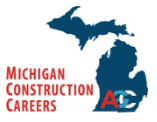Construction
Construction jobs involve more than just wearing a hard hat. They’re jobs that require problem-solving abilities and math skills like calculating measurements, weights, and the ability to read blueprints.
Possible career paths include:
- Carpenters
- Construction Laborers
- Construction Supervisors
- Electricians
- Plumbers, Pipefitters and Steamfitters

Key occupations in the Construction industry sector are expected to grow by 8.4 percent and have just under 34,800 average annual openings from 2020 to 2030.
Between 2011 and 2021, employment in Construction has grown by 50.6 percent, well above the 7.4 percent observed for total statewide employment. Construction currently employs 316,000 individuals across the state.
Construction has a nominal average salary of $76,500. This is significantly greater than the average salary for total statewide employment which sits at $61,700.
Many of the key occupations within the Construction sector only require some form of on-the-job training or an apprenticeship and have median hourly wages that exceed the statewide median ($21.73).
The Construction industry sector is a traditional apprenticeship sector with nearly 12,000 active apprentices in 2021, most of which were in the specialty trade contractor industry.

 YOUR FUTURE
YOUR FUTURE
The growing demand for trades jobs has opened new windows of opportunity. Apprenticeships provide expert, reputable training for young individuals looking for a career in construction.
Registered Apprenticeship is an industry-driven, high-quality career training program in which employers develop and prepare Michigan’s future workforce while apprentices gain paid work experience, related classroom instruction and a national industry-recognized credential upon program completion.

